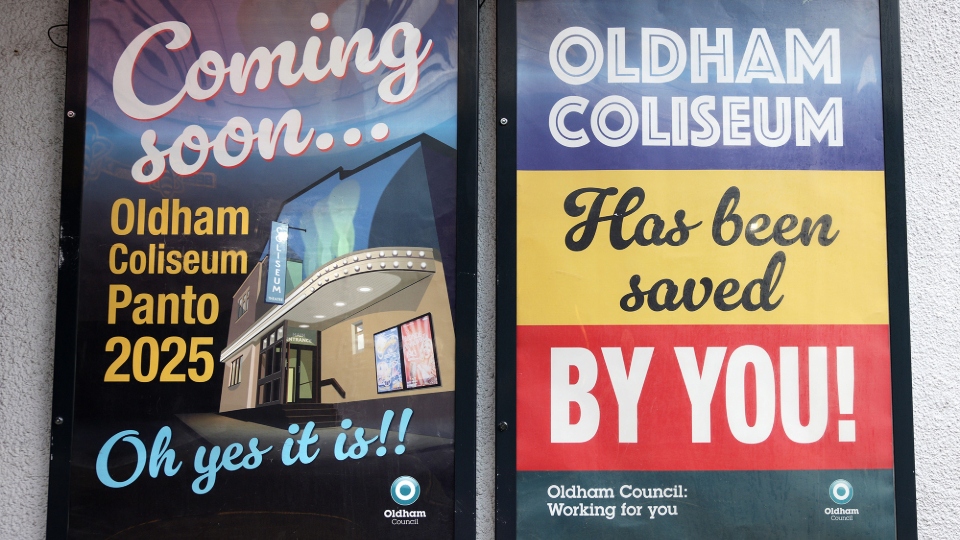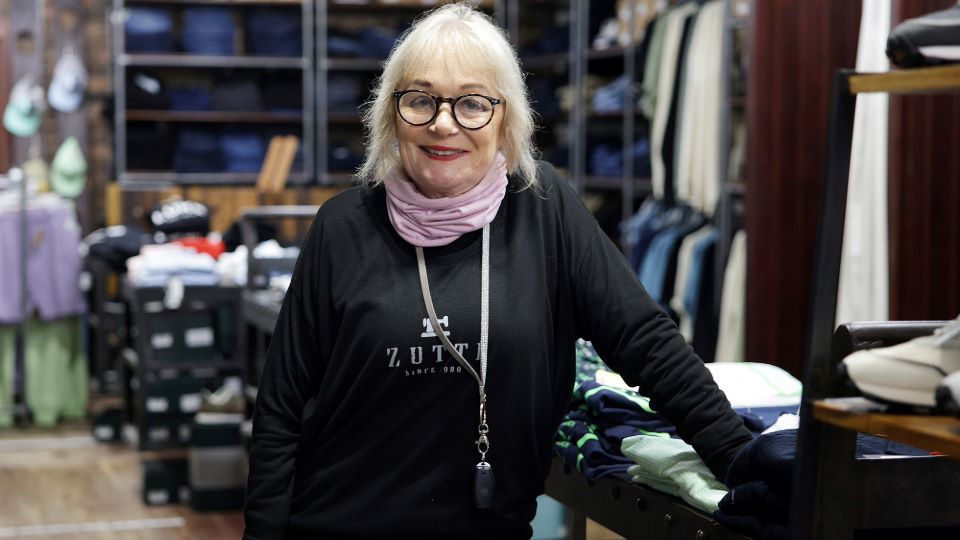Why Oldham’s Coliseum victory is a turning point for the borough
Reporter: Charlotte Hall, Local Democracy Reporter
Date published: 15 July 2024

Thanks to a tireless campaign by a group of grassroots campaigners, the council has agreed to foot the bill for a £10m refurb to bring the Coliseum back into working order - in time for Panto season 2025. Images courtesy of the MEN
A 53-year-old woman peers from under a polka-dotted umbrella to look at a washed-out building on Fairbottom Street in Oldham.
Above the stained white walls, faded letters spell out the theatre’s name, almost unreadable.
The Coliseum’s tired façade contrasts starkly with two shiny new posters affixed beside its boarded-up entrance.
One sign reads: ‘Oldham Coliseum – has been saved – BY YOU!’
For now, that’s the only indication that the fate of this historic and much-loved venue has changed.
The 139-year-old theatre closed down in March last year after losing its funding from Arts Council England.
But, thanks to a tireless campaign by a group of grassroots campaigners, the council has agreed to foot the bill for a £10m refurb to bring it back into working order – in time for Panto season 2025.
“When I heard the news I just had to come and see it,” the woman with the umbrella, Melanie Duignan, told the Local Democracy Reporting Service.
Melanie beamed as she reminisced about her formative experiences at the theatre.
The English teacher has lived and worked in London for much of her adult life but has never forgotten the many trips she made as a teenager from Bolton to the ‘most accessible theatre’ in Greater Manchester.
Melanie said: “I remember there was a musical called Girlfriends about the WAAF [Women’s Auxiliary Air Force]. I think I must have had a bit of a crush on one of the actors, so I went about six times – made my boyfriend take me twice, the poor lad.
“It’s full of really remarkable people, wonderful plays.”
Melanie is just one of thousands of people in Oldham and beyond whose lives have been shaped by the theatre.
It’s what has put such force behind the year-long campaign to rescue the site on Fairbottom Street.
“It was the absolute belief that saving this building was the right thing to do and the love of the people of Oldham, across the board, from all communities, for the Coliseum,” said Julie Hesmondhalgh.
The Mr Bates vs the Post Office actor has been one of the faces of the Save Our Coliseum campaign, alongside her partner Ian Kershaw, the Oldham-born screenwriter.
But it’s been far from an easy ride.
“We’re quite used to campaigning,” Julie told us, perched in a booth at the Bees Knees bar opposite the Coliseum, just moments before she was due to announce the theatre’s rescue on Monday, July 8.
“What we’re not used to is winning. I don’t think we ever thought that we would get to this day.”
For a long time, it didn’t seem as though the building on Fairbottom Street was even ‘on the table’, according to Julie.
The management had planned to move the Coliseum to a more modern venue, funded by the council, even before the closure.
But as they were drawing up the shiny new designs, Brexit, the pandemic and rising costs of construction wreaked havoc with the UK economy.
By the time Arts Council England declared the Coliseum too financially ‘high risk’ to fund and the theatre closed its doors in March 2023, designs for the £24.5m new building looked decidedly more modest than the ‘like for like’ venue the council had promised.
With a smaller auditorium, no fly-tower, wing space or rehearsal space, the new building would have been unsuitable for what the Coliseum has always been most famous for: the Oldham Panto.
Oldhamers didn’t want the new theatre.
But after the previous leader of the council claimed the building was “no longer fit for purpose”, it seemed as though they might not have a choice.
“It seemed impossible,” Julie said.
“I felt like banging my head against a wall.
“And then this newly minted building report came out at the beginning of this year saying the Coliseum needed some work but that it was doable – that’s when the campaign really stepped up.
“Fairbottom Street was back on the table.”
The report found that the building was ‘not beyond repair’.
The auditorium is still in good ‘nick’, according to Julie, and a number of persistent structural issues could be addressed over a number of years – along with changes to make the venue more wheelchair accessible.
Withhuge backing from the local community – and from stars ranging from Dame Emma Thompson and Christopher Eccleston to Sir Ian McKellen and Maxine Peake – the council had to reconsider their options – and eventually came around to the idea that the Coliseum was worth more than the unassuming building at first appeared.
The Coliseum’s rescue is a rare story of success in an otherwise bleak landscape.
Arts centres and theatres are struggling for survival across the UK with a 16 percent real terms cut from UK arts councils since 2017.
Asked what made the Coliseum campaign so successful, Julie had a decidedly local answer: “Oldhamers”.
“It’s the sense of civic pride, the sense of place, a sense of ownership that comes from these buildings,” she added.
Ross Symon, an Oldham machine setter who was waiting for a bus on Yorkshire Street a few days after the announcement, could attest to that.
He said: “The town has declined a lot over the years. But the Coliseum remained a mainstay and it felt like it would always be there.
“It was so sad to see it go. We used to go to the Panto every year, and last year we had to go to the Queen Elizabeth Hall instead – it felt like we were cheating on the Coliseum.”
“We need something to bring us together and celebrate this place,” said James McIntyre, another Oldhamer who has visited the theatre from a young age, said.
And it’s not just residents.

Down the road from the Coliseum, local businesswoman Maggie Hughes (pictured above) has run her clothes shop Zuttis for 44 years.
Maggie had a close relationship with staff and regular customers at the Coliseum, who came to buy her shirts.
She said: “A fantastic decision has been made to bring it back. It makes people remember that Oldham is still here! It’s a big boost for Oldham.
"Once people are here for the Coliseum, they wander into town and go to the other shops. It’s all connected.”
Beauty clinician Gillian, who used to take her grandkids to the Panto, agreed.
The business where she works, Tymbuktu, saw many of the actors and actresses dropping by for treatments.
“We’ve missed that,” she said.
“I’m absolutely delighted. It’s great for the businesses in the area, for the restaurants and cafes.”
Many people believe the Coliseum reopening will boost Oldham’s high street too.
Ian Kershaw envisions the theatre working even more closely with local businesses – letting visitors order pizzas from local restaurants to the theatre before shows and encouraging footfall to nearby bars and cafes – though he says planning is still in its earliest stages.
“We’re at a crossroads,” Ian added with a determined look in his eye.
“Fill [the town] with artists. Fill it with bars and pottery and paintings, fill it with everything.
"This town is on the cusp of becoming a very exciting place to be.”
Bees Knees manager Leyton is more cautiously optimistic.
He said he’d ‘lost a little day trade’ after the Coliseum shut down. And after investing a quarter of a million pounds into refurbishing his bar, he was ‘happy’ to see the reinvestment in the neighbouring theatre.
But he added: “It depends on what they do with it.
"The shows they were putting on before it closed weren’t the best.
“Hopefully that’ll change.”
Changes are underway.
With a new management board at the helm, who have managed to secure a £1.845 million funding package over three years from Arts Council England, the future’s looking brighter.
Council leader Arooj Shah has also promised a more ‘cooperative approach’ to running and keeping the Coliseum alive.
The council will act as more than a ‘landlord’ and become a ‘partner in the arts’ she said.
Julie and Ian are confident the new Coliseum has a more ‘sustainable business plan’ than previously – and note that the benefits of the reopening go far beyond the financial.
“We cannot have conversations about the working class having access to the arts without Oldham being a part of that,” Julie said.
In a BBC interview, she added: “Oldham Coliseum is a working class theatre for working class people.
"So many people got started there that wouldn’t have been able to otherwise.
Several actors including Sue Devaney, Jane Danson and Bernard Cribbins started their careers with the theatre.
And there was an established ‘pipeline’ for supporting homegrown talent into shining TV and stage careers with the Oldham Theatre Workshop and colleges, according to Ian, which needed protecting.
Especially at a time when the arts are accused of becoming a private schools’ club.
“What strikes me now is how inaccessible theatre and arts have become,” teacher Melanie Duignan told us.
“There’s a much bigger gap between what private school kids have access to and what state kids do compared to when I was growing up.
"It’s why venues like the Coliseum are so crucial.
"They need to keep doing what they’re doing – the silly stuff and the canonical – so everyone can have those opportunities.”
The Coliseum was many Oldhamers’ very first experience of theatre.
Whether through the Panto or in school trips to see anything from Shakespeare and Chekhov to Northern comedies and untested musicals, the shows at the Coliseum stick in the minds of those that see them and bring communities together.
It’s what a town like Oldham, where social inequality, lack of opportunity and divisive politics are a part of the pressures of everyday life, really needs, according to its residents.
“It’s dead good, the Coliseum,” Melanie laughs, twirling her umbrella before making her way into the distance like the Mary Poppins of the North.
But she’ll be back next year, along with most of the town, when the doors of the Coliseum finally swing open again.
Do you have a story for us? Want to tell us about something going on in and around Oldham? Let us know by emailing news@oldham-chronicle.co.uk , calling our Oldham-based newsroom on 0161 633 2121 , tweeting us @oldhamchronicle or messaging us through our Facebook page. All contact will be treated in confidence.
Most Viewed News Stories
- 1Historic Chadderton pub ‘invaded’ by Japanese Knotweed
- 2Super Oldham clinch League 1 title glory
- 3Rock on Tommy! - the Boundary Parkas prepare to release a very special song for Oldham
- 4GMP reinforces commitment to fighting neighbourhood crime and keeping victims safe
- 5Impressive A-level results at Hulme Grammar stand out against the national trend




